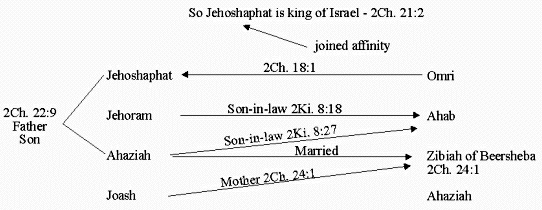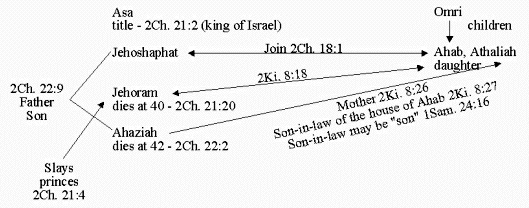Study to shew thyself approved unto God, a workman that needeth not to be ashamed, rightly dividing the word of truth. 2 Tim. 2:15

King James AV1611
The Book of Matthew
Matthew was taught by Dr. James Modlish
CHAPTER ONE
Intro: The first book of the New Testament, introduces Christ (the Messiah), to Israel, as their king. (Not to Gentiles as their Saviour.) It's Jewish flavor that is so apparent, it can't be missed! It begins with the genealogy of Abraham and is written from the standpoint of an Old Testament Hebrew awaiting the "anointed one."
Matthew was written sometime around 64-66 AD, by Matthew the publican (9:9; 10:3).
Matthew is places first in the New Testament as a logical link between Malachi and the events that are about to take place around the first appearance of our Incarnate Lord.
As a transition book, it can be dangerous.
1:1 Last time "book of generations" was in (Gen. 5:1). Adam is a type of Christ (Rom 5:16-21) and (1 Cor. 15:45-47). However in Adam's live we read "and he died," but in Matthew there is no record of anyone dying! Adam represents death (1 Cor. 15:22) and Christ Life! (Vs. 1) gives Bible insight into usage of the word "Son: which can be a five times removed grandson, or an adopted son (Lk. 3:23).
1:2 Judah here is transliterated "Judas." Slight differences in spelling will pop up, Pedro, Pierre, Pietro, Peter, and Petra are all the same name in Spanish, French, Italian, English and Greek. However Matthew must be introducing us to something more than a spelling change. See (Rev. 5:15). Could it be that the Anti-Christ has even imitated the tribe from which the "Lion" came. (Jn. 17:12; 2 Thess. 2:2,3; Rev. 17:8).
1:3 Thamar (although not stated) appears to be a Canaanite (Gen. 38), but why would that be a surprise when we have an Amorite (Rahab), a Moabite (Ruth), a Hittite (Bath-Sheba), and an Ammonite (Rehoboam's wife) in the list.
1:4 Amminadab is mentioned in (Song. 6:12) in connection with the 2nd Advent and his Son is a leading warrior in the tribe (Num. 1:7).
1:6 RSV reads "by the wife of Uriah." This seems at first to line up with (2 Sam. 12:5), but the thing is complicated by (2 Sam. 11:27). One possible explanation is she was Uriah's wife when the child was conceived, which leads to another interesting point; God calls it a child in the womb. At any rate (11:27) helps set the definition of marriage: any real student of the Bible knows marriage is not a ceremony some would say it's simply flesh joining flesh (1 Cor. 6:15,16) this is marriage in the flesh, but its not a real marriage because it lacks unity in the spirit (vs. 17), furthermore if it is marriage there is no such thing as fornication (vs. 18). So all these live-ins are more married than they think they are , even in the eyes of the law, Palimony1:7 Roboam is Rehoboam (Bill Clinton) is a half-breed from an Ammonitess mother (1 Ki. 14:21) and Abia is the Abijah of (2 Chron. 14).
(Vs. 6-7) launch us into a line of Jewish kings, which reminds us the Anointed Messiah will be a king over Israel, and as such, it is essential that he have a genealogical record of His decent from the kings.
Ch. 1 - Genealogy of the king
Ch. 2 - birth of the king
Ch. 3 - the herald of the king
Ch. 4 - the presentation of the king
Ch. 5-7 - the constitution of the kingdom
Ch. 8,9 - the credentials of the king
Ch. 10 - the message of the kingdom
Ch. 11 - the rejection of the kingdom
Ch. 12 - the unpardonable sin in rejecting the king
Ch. 13 - the whole matter of the kingdom goes into a parabolic state described as "mysteries." See (13:1)


1:8 Josaphat = Jehoshaphat
Joram = Jehoram
Ozias = Ussiah
However in 2 Chron. the monarchy runs Jehoshaphat (21:1), Jehoram (21:1), Ahaziah (22:1), Joash (24:1), Amaziah (25:1), Uzziah (26:1).
Matthew inserts only one king between Jehoshaphat and Uzziah. Chronicles lists all four.
We have learned that a "son" can be several generations removed, but in (Matt. 1:17), we are told there are 14 generations but if Ahaziah, Joash and Amaziah were included, there would be 17.
Ahaziah, Joash, and Amaziah are missing in Matthew. Age contradiction concerning Ahaziah ought to be a tip off instead of a criticism (2 Ch.22:2, 2 Ki.8:26).
[1]. Ahaziah is not a direct descendant of Judah's king.
[2]. Jehoram had Ahab's (Northern- Israel) daughter for a wife (2 Ki. 8:18).
[3]. Ahaziah's mother was not Ahab's daughter she was Ahab's sister (2 Ki. 8:26), for both Athaliah and Ahab were Omri's children (1 Ki. 16:39).
1:9,10 Only the spellings are different:
Ozias = Uzziah
Joatham = Jotham
Achaz = Ahaz
Ezekias = Hezekiah
Manasses = Manasseh
Amon = Same
Josias = Josiah
1:11 Josiah
Jehoahaz - disposed (2 Chron. 36:4)
Eliakim - name change to Jehoiakim (brother to Jehoahaz)
Jehoiachin - Jechonias of Matt. (son of Jehoiakim)
Zedekiah - brother to Jehoiachin (son of Jehoiakim)
The Jechonias of (Matt. 1:11) must refer to Jehoiachin, the last monarch before Zedekiah, for it says "about the time they were carried away."
Notice who is preaching to Israel at this time, (2 Chron. 36:21,22).
Notice what Jeremiah says about Jehoiachin the son of Jehoiakim, he changes his name to Connie, (Jer. 22: 24-30). (Vs. 30) is absolute evidence of the virgin birth he is written childless in the sense that non of his seed shall occupy the throne!
1:12,13 At this point, the Messianic line begins to become obscure, if you try to trace it through Ezra, Nehemiah and Chronicles you know that.
Jechonias, Salathiel, Zerubbabel: 1 Ch. 3:17-19.
But after Zerubbabel the list does not match with Matthew and the thing gets very difficult to figure out; But perhaps the reason is in Zech. 4:6-10 where we discover Zerubbabel is a type of Christ! He led his people back into the land!
1:16 "Jesus, who is called Christ"
Jesus - human name - as in (vs. 25)
Christ - Anointed One
The Holy Spirit is careful to point out there is more than one "Christ" (Lk. 2:26; Acts 4:26), so when the liberals constantly use only "Christ" they are paving the way for another anointed one (Eze 28:14).
"Jesus" needs to be emphasized (Phil 2:9,10) but those who use only "Jesus" tend to get in the flesh, because that's His name. His full and correct title is the one Paul used more than any other "Lord Jesus Christ" (1 Cor. 16:22,23; 2 Cor. 1:3).
1:17
[1]. Matthew has left some names out for reasons observed, so that it comes out an even 42 generations. This takes up a period of 1921-1992 years which breaks down to 45-57 years per generation.
[2]. In (1 Chron. 6) from Abraham to David, through the priestly line of Aaron there are 14 generations, it breaks down to 45-47 years.
[3]. In (Gen. 15:13-16) a generation is 100 years.
[4]. In (Ps. 90:10) a generation is 70 years
The interest in (Matt. 24:34). In all probability, its not 100 - because when that was stated, people were living longer.
1:18 The virgin birth is only a surprise to Bible correcting scholars (Isa. 7:14), the meaning of the verse is continually verified: (Lk. 1:34; Jn. 3:16; Rom. 1:4; Matt. 11:27; Mk. 14:61,62).
1:19 According to (Deut. 22:13-21) Joseph had the legal right to have Mary killed but exceeded the law (because he was a just man) and had in mind to apply (Deut. 24:1-3). Just men are always interested in more than the bare minimum of the law. A study of (vs. 19,20,24) demonstrate that people could be called man and wife while betrothed (Deut. 22:23,24), also see Gen. 29:21. The NIV uses the word "divorce," but it is incorrect, because a divorce comes after physical relations, Deut. 24:1, otherwise where would we get the idea of annulment from.
1:20 The Angel of the Lord occupies a unique position here, for the term is found in both Testaments as applying to the Lord Jesus Himself, (Gen. 32:24,30; Jud. 13:17,22; Acts 27:23; Gal. 4:14). Because he is the Holy Ghost, there is a bodily shape involved, (Gal. 4:19).
1:21 Compare (Lk. 1:30-33), but Joseph did the naming, (vs. 21,25). The word Jesus is full of meaning: it is the Old Testament Joshua.
Jesus is substituted for Joshua in (Heb. 4:8, Acts 7:45).
These verses point out that the wilderness journey will be repeated in the future (Mic. 7:14,15) (1366); (Hos. 2:14-20).
The book of Joshua is a type of 2nd Advent.
* His People - (Lk. 1:7, Acts 3:25,26); It is never clearly expanded upon until (Acts 10:43) - makes you wonder why then people want to build their theology upon Jewish doctrine! His people definitions: (Deut. 32:36,43; Ps. 44:12).
1:22 "By the prophet" is omitted in the RSV, it's necessary to demonstrate the transmission of the Word.
1:23 Virgin - (Isa. 7:14) - Seed of a woman (Gen. 3:15). Emmanuel - see notes.
-Page Navigation-
Chapters: 1 | 2 | 3 | 4 | 5 | 6 | 7 | 8 | 9 | 10 | 11 | 12 | 13 | 14 | 15 | 16 | 17 |18 | 19 | 20 | 21 | 22 | 23 | 24 | 25 | 26 | 27 | 28
